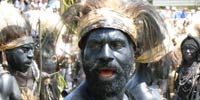Papua New Guinea- Goroka

 3:00
Skye Rohde
3:00
Skye Rohde
Goroka Cultural Show, Papua New Guinea.
Broadcast: Mar 12 2007 on NPR Day to Day Subjects: International, World, Cultural
Audio Postcard: Celebration in Papua New Guinea
March 12, 2007 from Day to Day
MADELEINE BRAND This is DAY TO DAY from NPR News. I'm Madeleine Brand, with a break in the program now for a very good time in a faraway place.
ALEX CHADWICK, host: The island nation of Papua New Guinea. I'm Alex Chadwick. Papua New Guinea is near Australia. There are five million people and more than 800 languages and cultures. The people there learn about their differences and similarities at two-day-long cultural shows held around the country every year. Producer Skye Rohde went to last year's Goroka show in the highlands region of the country. SKYE ROHDE: It's Independence Day and the Goroka show is a photographer's dream - reds and yellows and oranges are everywhere. Bird of paradise feathers frame painted faces. Grass skirts swish and oiled skin glistens. The show is almost sensory overload. It's also the social event of the year in Goroka, the capital of Eastern Highlands Province. It even trumps church, which in a very Christian country like Papua New Guinea is saying a lot. (Soundbite of singing) ROHDE: You're best up arriving early. But even then you're slowed down by the dozen of groups singing and marching down Goroka's bumpy streets. Some of them can fit into the backs of pickup trucks, the feathers in their headdresses bobbing every time the trucks hit a rut in the road. But most people walk, as they've always done, to the grassy fairground on the west side of town. (Soundbite of singing) ROHDE: Find a spot by the fence once you've paid your five Kina to get into the show. The groups hurried by. The white tourists snap away with their cameras. The locals watch and chat and wave to wontoks(ph), their relatives, when they see them. (Soundbite of drums) ROHDE: It lasts for hours. Groups march in one by one and stake out their patches of grass. After the initial ooh-aah of it, you'll probably wander away to buy a Coke, a Fanta, maybe a bag of Twisties if there's cash to spare. But eventually you'll be drawn back to the singing and dancing. (Soundbite of people singing) ROHDE: You can't miss the Esichorai(ph) group. Maybe two dozen men and girls sit on a platform made of woven pitpit(ph), kind of a skinny bamboo. They have yellow and white mud smeared on their faces and feather headdresses. As they sing, they turn their heads side to side, touching their chins to each shoulder. It's a courting song, sung when a certain tree in the village bears new leaves. (Soundbite of music) ROHDE: Something catches your ear. Coming from that group of guys over there, the one shuffling in a circle. You walk a little closer to check out what they're doing. The men play a little homemade pan flute. The thing is, these guys stand out because they're not flashy. In a show full of color and stage presence, these men perform quiet pride. (Soundbite of music) ROHDE: The show goes on. But once the sun is low, it's time to head home. You hop in the back of the pickup truck. It heads across the grass and into the street choked with people. You sneak through oh-so-slowly and then you head north. It's 10 minutes to the village and another year until the sing-sing returns to Goroka town. CHADWICK: Produce Skye Rohde came to use courtesy of the radio collective Hearing Voices.
